Israeli forces reportedly kill at least four protesters and wound over 400 with live ammunition and tear gas during Gaza Return March demonstrations on Friday.
By +972 Magazine Staff
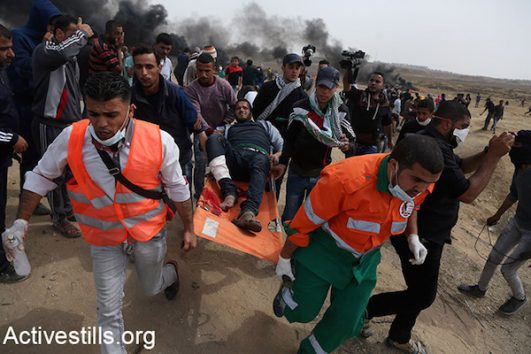
Israeli forces opened fire on protesters participating in the Great Return March on Friday for the fourth consecutive week. The Great Return March, which began on Land Day, March 30, is a 45-day series of events planned to culminate on May 15, Nakba Day.
[This post is being updated as events unfold.]
Update: 7:10 pm
Palestinian and Israeli media reporting that four Palestinians have been killed during today’s protests in Gaza, among them a 15-year-old boy.
The Palestinian Ministry of Health is reporting that 445 people have been wounded from live fire and tear gas inhalation during Friday’s protests.
Update: 7:05 pm
Palestinian and Israeli media are reporting that Israeli forces have shot and killed a third Palestinian protester.
Update: 5:10 pm
Palestinian media are reporting that roughly 100 protesters have been wounded today.
Update: 3:20 pm
Palestinian media are reporting that a second protester has been killed by Israeli gunfire near Jabalia.
Update: 3:15 pm
The Palestinian Ministry of Health is reporting that at least 40 protesters have been wounded during the protests today.
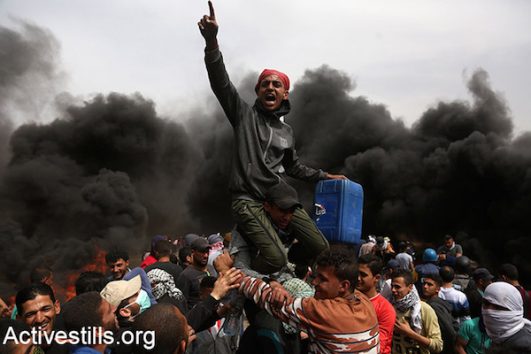
As of 2pm on Friday, the Palestinian Ministry of Health reported that Israeli forces shot and killed a 25-year-old, handicapped Palestinian man during the day’s protests.
Earlier on Friday morning, IDF planes dropped leaflets warning Gaza residents against participating in the protests. “To the residents of Gaza,” the leaflets stated, “you are participating in violent public disturbances. Hamas is exploiting you to commit acts of terror. The IDF is prepared for anything. Avoid approaching the fence or damaging it […] Do not obey the orders from Hamas that endanger your lives. A different way is possible – your future is in your hands.”
Since the Great Return March began in late March, Israeli sharpshooters and snipers have shot over 1,000 unarmed Palestinian protesters, killing more than 30 people.
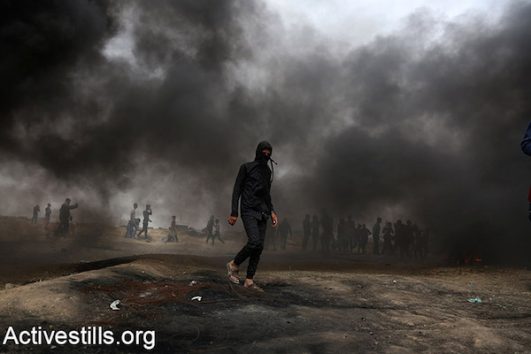
Israeli authorities have doubled down on the decision to use live fire against the unarmed Palestinian protesters, despite international criticism and calls for an independent investigation into the killings.
Following protesters during the first week of April, Fatou Bensouda, chief prosecutor for the International Criminal Court, warned that “violence against civilians — in a situation such as one prevailing in Gaza” could constitute war crimes.
Israeli human rights group B’Tselem has urged Israeli soldiers to refuse orders to open fire on the protesters. Four prominent Israeli human rights groups petitioned the High Court of Justice last Sunday demanding that the court order the state to revoke the rules of engagement that permit shooting demonstrators who pose no danger to human life.
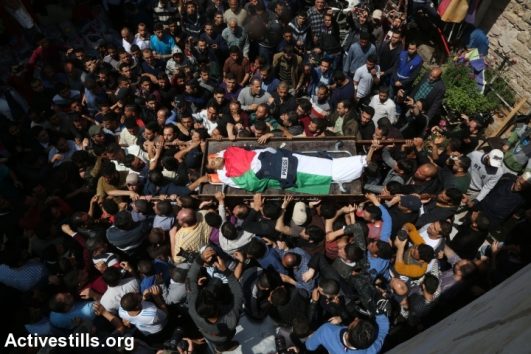
During protests earlier in April, Israeli forces shot at least six journalists in one day. Among them was Yasser Murtaja, a photographer for “Ain Media,” who was reportedly wearing a helmet and vest clearly marked “PRESS” when he was shot; he later died of his wounds.
Inside the Gaza Strip, the Palestinian protesters have built a tent encampment with different tents corresponding to the villages and towns that were destroyed during the Nakba (in Arabic, the Catastrophe), in 1948. More than 700,000 Palestinians were expelled or fled their homes during the 1948 war and its aftermath. Israel subsequently destroyed nearly all of their homes and villages.
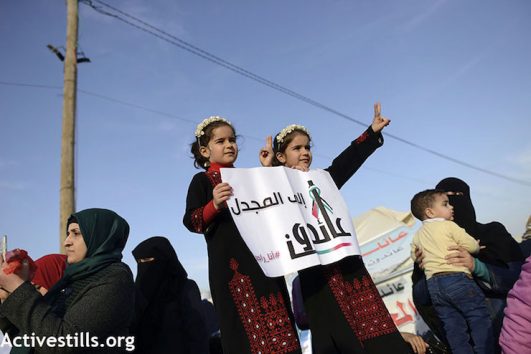
Some 70 percent of the Gazan population are refugees, meaning they, their parents, or their grandparents fled or were expelled from towns, villages, and cities inside the territory that became Israel in 1948.
Speaking to +972 Magazine before the first day of protest last month, one of the ‘Great Return March’ organizers, Hasan al-Kurd, explained that the plan was to set up camps between between 700-1000 meters from Israel’s border fence, outside the Israeli army’s unilaterally imposed buffer zone. In the weeks leading up to Nakba Day, there would be weekly marches as well as bicycle races and other events.
By mid-May, the Return March organizers hope that hundreds of thousands of Palestinians will join.
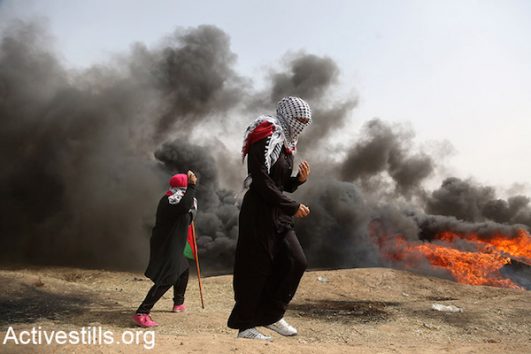
“We want families. We want to live in peace — with the Israelis,” al-Kurd said. “We will make sure the protest doesn’t escalate to violence — at least from our end.”
Even before the march began, however, Israeli security forces launched a public campaign painting the ‘Great Return March’ as a violent, Hamas-sponsored event. The Israeli army’s chief of staff announced the deployment of 100 snipers and several infantry brigades to the area of the Gaza border fence. Israeli generals warned that there would be casualties.
On Land Day and Nakba in 2011, the last time a protest march of a similar scale was attempted, thousands of Palestinians from Lebanon, Syria, the West Bank, Gaza, and inside Israel marched on Israel’s borders. The army responded with gunfire on the Lebanese, Syrian, and Gaza borders, killing dozens and wounding hundreds.
